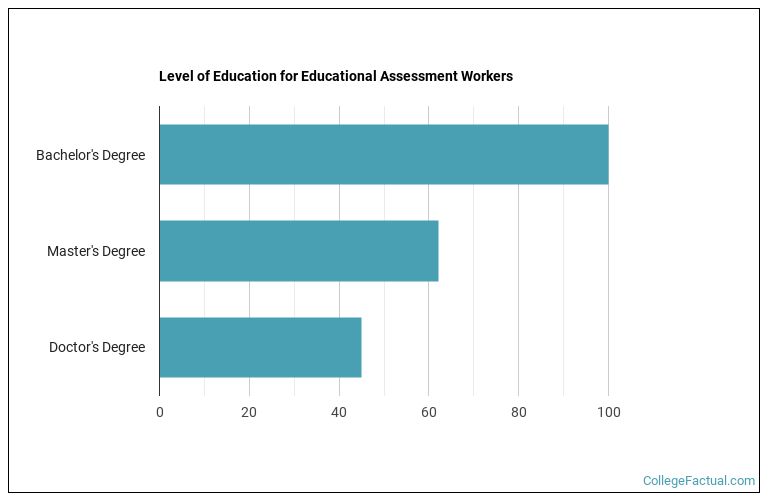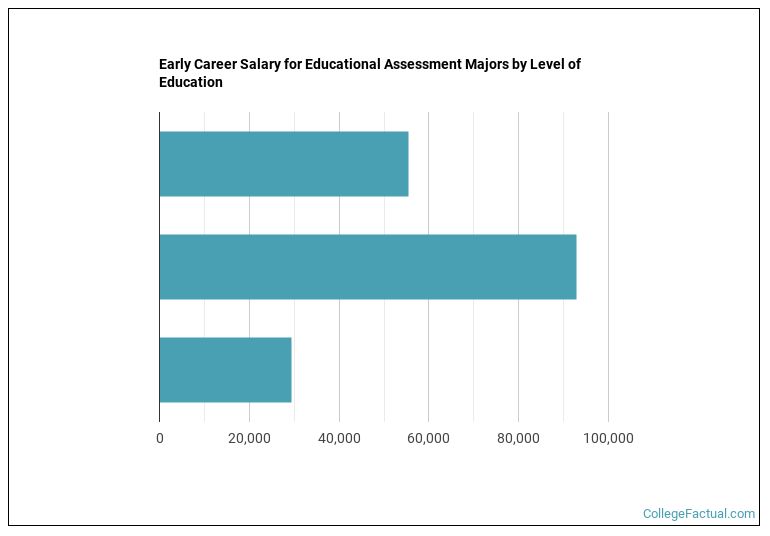 by our College Data Analytics Team
by our College Data Analytics TeamThis is a program that allows you to help design, develop, use, and evaluate educational tests and other devices used to evaluate student learning and progress. You will learn how to apply the data and analyze the development of the students and the educational programs. This will allow you to gather the information needed to plan and develop more effective tests and techniques to help students grow and develop.
Every school will have different major requirements, but some courses you may take include: instruction in evaluation theory, evaluation research design and planning, data analysis, data interpretation, data reporting, research evaluation, test implantation, economics, and policy.
Concentrations in this major include: Educational Evaluation and Research, Educational Statistics and Research Methods, Educational Assessment, Testing, and Measurement, Learning Sciences, and other types of Educational Assessment, Evaluation, and Research.
Educational Assessment was the 184th most popular major in the 2021-2022 school year. Colleges in the United States reported awarding 3,853 degrees in this year alone. Our 2025 Best Educational Assessment Schools ranking analyzes 22 of these schools to determine the best overall colleges for educational assessment students. Continue reading to check out one of our many unbiased rankings of assessment programs later in this article.
This is a good path for people who are attracted to the education field, but do not want to work directly with students every day. You should like to work with data and statistics and be interested in analyzing and researching. Not only should you like to gather the information, but in this field you should have the desire to take your findings and figure out how to update and manipulate the current programs in order to make them more effective and more efficient. It is important to be able to think logically and clearly.
Communication skills are important. You will find it necessary to explain the changes that need to be made in order to create more effective assessments to measure success for both students and teachers.
A high school diploma or equivalent is typically required for most assessment degree programs and many students will need a minimum GPA and SAT/ACT score depending on the school. In addition to these basic educational assessment program qualifications, to serve in some assessment careers, special certification may be required outside of your degree.
There are various different levels of assessment degrees. You can spend many years getting as high as a in educational assessment to something that takes less time like a . Educational Assessment programs can take anywhere between one to four or more years for a full-time student to complete.
| Degree | Credit Requirements | Typical Program Length |
|---|---|---|
| Associate Degree | 60-70 credits | 2 years |
| Bachelor’s Degree | 120 credits | 4 years |
| Master’s Degree | 50-70 credits | 1-3 years |
| Doctorate | Program required coursework including thesis or dissertation | At least 4 years |
A doctor's degree is the most common level of education achieved by those in careers related to assessment, with approximately 44.9% of workers getting one. See the the most common levels of education for assessment workers below.
| Level of Education | Percentage of Workers |
|---|---|
| Doctoral Degree | 43.9% |
| Bachelor’s Degree | 38.6% |
| Master’s Degree | 17.4% |
| Post-Doctoral Training | 0.0% |
| Post-Master’s Certificate | 0.0% |
About 62.2% of workers in careers related to assessment obtain at least master's degrees. See the chart below for the most common degree level workers in educational assessment have received.

This of course varies depending on which assessment career you choose.
This field will prepare you to go into the educational testing world. You could work with companies like Pearson, ETS (Educational Testing Service), or the state for state examinations. You may work directly with data or you could be researching more effective ways to teach or test. This major will not prepare you for just one specific career path.
Want a job when you graduate with your assessment degree? Educational Assessment careers are expected to grow 9.9% between 2016 and 2026.
The following options are some of the most in-demand careers related to educational assessment.
| Occupation Name | Projected Jobs | Expected Growth |
|---|---|---|
| Education, Training, and Library Workers | 124,900 | 10.8% |
| Education Professors | 82,200 | 10.3% |
| Social Scientists | 44,900 | 6.7% |
| Social Sciences Professors | 16,800 | 9.8% |
Recently graduated educational assessment students earned an average of $59,531 in <nil>. Earnings can range from as low as $26,457 to as high as $113,246. As you might expect, salaries for assessment graduates vary depending on the level of education that was acquired.

Salaries for educational assessment graduates can vary widely by the occupation you choose as well. The following table shows the top highest paying careers assessment grads often go into.
| Occupation Name | Median Average Salary |
|---|---|
| Social Sciences Professors | $87,950 |
| Social Scientists | $85,750 |
| Education Professors | $73,680 |
| Education, Training, and Library Workers | $46,680 |
With over 273 different assessment degree programs to choose from, finding the best fit for you can be a challenge. Fortunately you have come to the right place. We have analyzed all of these schools to come up with hundreds of unbiased assessment school rankings to help you with this.
One of 14 majors within the Education area of study, Educational Assessment has other similar majors worth exploring.
| Major | Annual Graduates |
|---|---|
| Learning Sciences | 2,449 |
| Educational Evaluation & Research | 631 |
| Educational Statistics & Research Methods | 326 |
| Other Educational Assessment, Evaluation, & Research | 285 |
| Educational Assessment, Testing, & Measurement | 156 |
| Related Major | Annual Graduates |
|---|---|
| Teacher Education Grade Specific | 110,770 |
| Educational Administration | 46,975 |
| Teacher Education Subject Specific | 42,343 |
| Special Education | 35,973 |
| General Education | 29,389 |
Image Credit: By US Navy Mass Communication Specialist 1st Class Paul J. Phelps under License More about our data sources and methodologies.